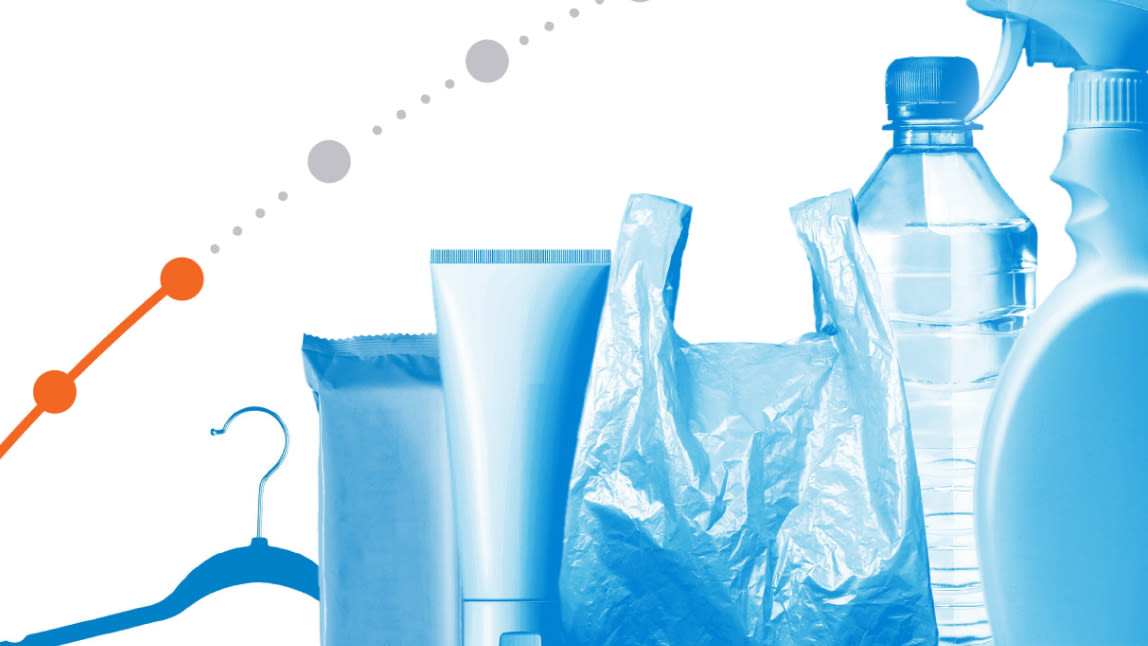Global Commitment 2021 progress report shows that after decades of growth, virgin plastic use appears to have peaked in 2021 for Global Commitment brands and retailers and is set to fall by almost 20% by 2025
Progress largely driven by recycling but that is not enough to solve plastic pollution - much more focus must urgently go to eliminating single-use packaging
There is unprecedented momentum behind calls for a global agreement on plastic pollution
Global Commitment brands and retailers have collectively reduced their consumption of virgin plastic in packaging for the second year running, according to new data.
Three years after launching the New Plastics Economy Global Commitment, the Ellen MacArthur Foundation and the United Nations Environment Programme said it appeared virgin plastic use had peaked for its signatories and was now on a downward trend.
This trajectory will be accelerated by new commitments that are set to see virgin plastic use fall by almost 20% in absolute terms by 2025 compared to 2018. Setting a reduction target has become mandatory for all the Global Commitment’s 63 brand and retail signatories in 2021.
When combined with the impact of existing commitments, it is estimated that raising ambitions to this level will avoid 8 million tonnes of virgin plastic from being produced each year by 2025. That is equivalent to keeping 40 million barrels of oil in the ground.
While this virgin plastic reduction is a welcome trend, current and planned progress is driven largely by just switching from virgin plastic to recycled plastic. This is just one part of the solution, but does not address the total amount of plastic packaging on the market. There is very little evidence of ambitious efforts to reduce the need for single-use packaging in the first place. Less than 2% of signatories’ plastic packaging is reusable, and for more than half of all signatories, this is 0%.
Dame Ellen MacArthur, Founder & Chair of Trustees of The Ellen MacArthur Foundation, said: “We won't recycle our way out of plastic pollution, eliminating single-use packaging is a vital part of the solution. Alarmingly, our report shows little investment in this. We need much more urgent focus on upstream innovation to rethink how to deliver products without packaging or by using reusable packaging. This doesn’t just allow us to design out waste, it also means we can design out carbon emissions whilst creating new opportunities for business. Shifting just 20% of plastic packaging from single-use to reuse is an opportunity estimated to be worth USD 10 billion.
Voluntary initiatives like the Global Commitment have begun to deliver change, but it has been recognised by a large number of businesses and countries that voluntary initiatives alone will not be enough. Global Commitment signatories are responsible for just over 20% of global plastics packaging. We need a coordinated global response so the entire industry and all governments move at the necessary scale and pace.
There is unprecedented momentum behind a global agreement on plastic pollution. Over 80 leading businesses and 119 national governments have called for a global agreement to tackle plastic pollution, and more than 2 million people have signed a public petition in support. UNEA 5.2 in February 2022 is the crucial moment, when governments will decide on next steps, including whether to start an intergovernmental negotiation for a global agreement.
Inger Andersen, UNEP’s Executive Director said: "The Global Commitment is showing us that concerted voluntary action by actors across the value chain, including governments, can begin to shift the needle in the fight against plastic pollution. The efforts from all signatories in reporting their progress transparently and with agreed metrics is truly commendable, and a great example to learn from. The frontrunners are also demonstrating that we can decouple the benefits we derive from plastic from the consumption of virgin plastic, and this is groundbreaking. But the action from these frontrunners can be boosted by a comprehensive, inclusive and global approach.”
For more information or to request an interview, please contact Gabriella Hewitt gabriella.hewitt@emf.org
Notes to Editor
Assets
All assets, including the report can be found here.
About the Ellen MacArthur Foundation
The Ellen MacArthur Foundation is an international charity that develops and promotes the circular economycircular economyA systems solution framework that tackles global challenges like climate change, biodiversity loss, waste, and pollution. It is based on three principles, driven by design: eliminate waste and pollution, circulate products and materials (at their highest value), and regenerate nature. in order to tackle some of the biggest challenges of our time, such as climate change, biodiversity loss, waste, and pollution. We work with our network of private and public sector decision-makers, as well as academia, to build capacity, explore collaborative opportunities, and design and develop circular economy initiatives and solutions. Increasingly based on renewable energyrenewable energyEnergy derived from resources that are not depleted on timescales relevant to the economy, i.e. not geological timescales., a circular economy is driven by design to eliminate waste, circulate products and materials, and regenerate nature, to create resilience and prosperity for business, the environment, and society.
Further information: www.ellenmacarthurfoundation.org | @circulareconomy
About the Global Commitment
The New Plastics Economy Global Commitment, led by the Ellen MacArthur Foundation in collaboration with the UN Environment Programme, unites businesses, governments, and other organisations behind a common vision and targets to address plastic waste and pollution at its source. Signatories will work to eliminate the plastic items we don’t need, innovate so all plastics we do need are designed to be safely reused, recycled or composted, and circulate everything we use to keep it in the economy and out of the environment.
Since launching in 2018, more than 500 signatories have committed to keeping plastics in the economy and out of the environment, including companies representing 20% of all plastic packaging produced globally. All business and government signatories commit to ambitious 2025 targets and public annual reporting.
Further information: emf.org/global-commitment | @circulareconomy
About the UN Environment Programme
UNEP is the leading global voice on the environment. It provides leadership and encourages partnership in caring for the environment by inspiring, informing and enabling nations and peoples to improve their quality of life without compromising that of future generations.
UNEP@50: A time to reflect on the past and envision the future
The 1972 United Nations Conference on the Human Environment in Stockholm, Sweden, was the first-ever UN conference with the word “environment” in its title. The creation of the UN Environment Programme (UNEP) was one of the most visible outcomes of this conference of many firsts. UNEP was created quite simply to be the environmental conscience of the UN and the world. Activities taking place through 2022 will look at significant progress made as well as what’s ahead in decades to come.





